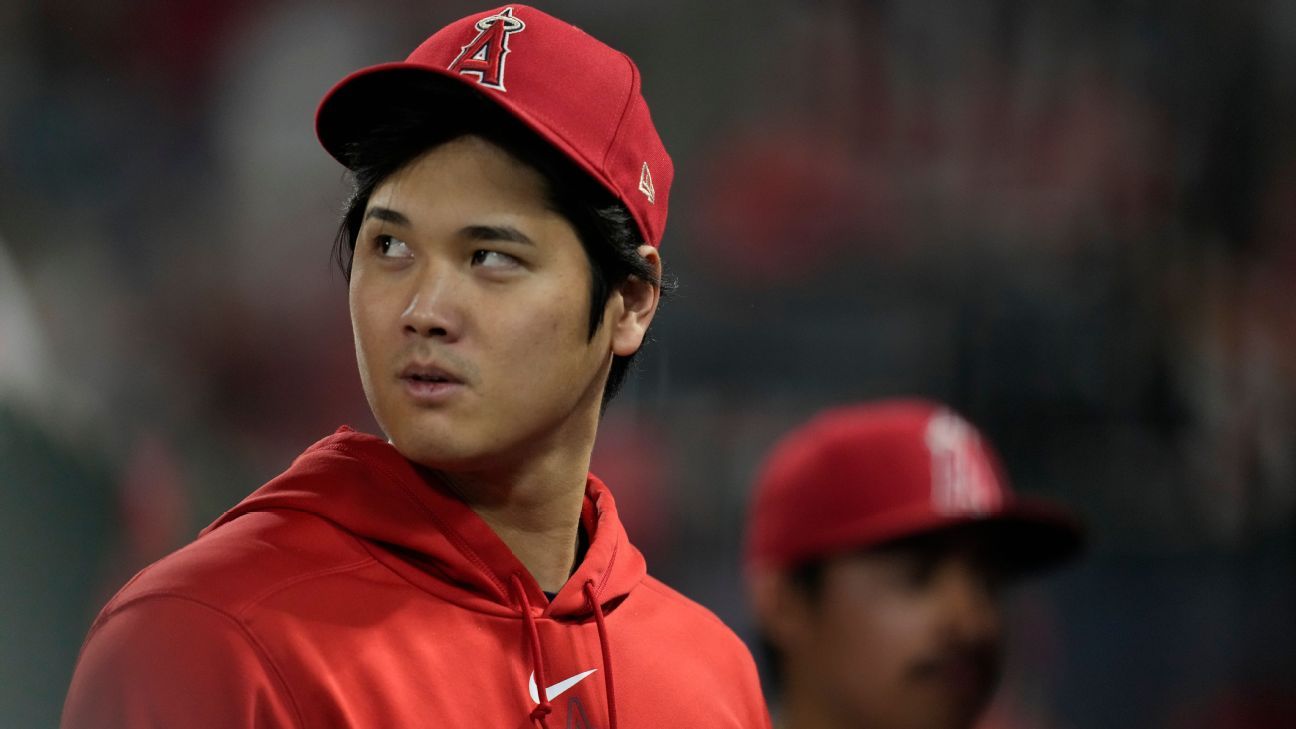Somebody should ask Shohei Ohtani a really simple question about his free agency:
What is the point of all of this secrecy?
Of course, that would imply that anyone had heard from Ohtani in the past four months. Maybe his silence is Ohtani’s choice, or maybe somebody is giving him some really awful advice. But the way this historic free agency has played out is unnecessarily joyless — and completely antithetical to the way Ohtani competes, the way he loves his craft.
His short journey through free agency could have been a celebration of baseball. Ohtani has more leverage than any player ever. Everybody wants him, and everybody wants to give him a lot of money. This really should all be fun, generating excitement among baseball fans dreaming of Ohtani in the lineup of their favorite team.
Instead, his decision is being handled like delicate negotiations over a secret spy swap. There is silence and threats, with club executives rolling their eyes as they describe the warnings they have been given from Ohtani’s camp about publicly discussing their efforts to sign the most dynamic and popular talent on earth. “Sorry, can’t talk about the guy everybody is talking about,” said one general manager, laughing.
At the winter meetings Tuesday, Los Angeles Dodgers manager Dave Roberts confirmed that the team had recently met with Ohtani at Dodger Stadium. (NEWS FLASH: The Biggest Spending Team talks with the Most Prominent Free Agent!) Immediately, there were follow-up questions about why he would release the information in the face of the information blackout enforced by Ohtani’s camp, which has said that it will hold leaks against teams with which they are negotiating. General manager Brandon Gomes admitted a few hours later that he was surprised Roberts had confirmed the meetings, refusing to comment on them himself.
None of this is necessary. At the All-Star Game, Ohtani circulates among temporary teammates, laughing and posing for pictures, signing autographs for them. There is so much respect for him and for his unique talent, and his free agency could have had the same feel.
Instead, this is our reality: A couple of weeks ago, Ohtani sat with a cute dog as he was awarded the Most Valuable Player. It raised a simple question: What’s the name of the dog?
As discussed on the Nov. 20 BBTN podcast, calls were made to ascertain that small detail. The response, through channels, was this: Ohtani’s camp was not prepared to release the dog’s name. Again, maybe this was Ohtani’s decision. Maybe he was getting bad advice. But it was really pretty silly.
He is arguably the greatest international baseball star since Babe Ruth, transcending the sport’s typical orbit, and the potential impact of that during his free agency has been squandered. Just imagine how much better served we all would have been if this window was handled progressively, rather than with paranoia. Just as he has done on the field, Ohtani could have set a new standard — this time for free agent campaigns.
Imagine if Ohtani had concluded his visit with the Toronto Blue Jays — the one that neither manager John Schneider nor GM Ross Atkins would confirm Tuesday, given multiple opportunities — with a Zoom call with reporters. He could open with an homage to the city of Toronto, before describing the impressive tour of the team’s new spring training complex. He could’ve talked about Vladimir Guerrero Jr.’s power, Bo Bichette‘s aggressiveness at the plate, Kevin Gausman‘s splitter. He could’ve mentioned Schneider’s humor, thanked Mark Shapiro and Atkins for their time. He could’ve capped his reflections with an observation about the Maple Leafs, about Joe Carter’s home run. And he could have wrapped it up by announcing a donation to Jays Care — say, $50,000, pocket change for a player who already makes tens of millions of dollars in endorsements, before he gets the richest contract in the history of North American professional sports — to help children. He could’ve deftly answered a few questions from local reporters, easily deflecting the question of where he intends to play by saying he was still going through the process.
He could’ve done the same thing with the Chicago Cubs, the Dodgers and every other team he considered. No matter which team he picked in the end, his time with each franchise would’ve lifted up the organization, its players, and raised awareness for their charity. He could’ve lifted baseball.
Ohtani is entitled to his privacy, of course, and as we’ve seen with other sports, employment choices made in the full glare of fan attention can go wrong. LeBron James has excelled in his handling of his career, but you wonder if he would broadcast The Decision again, if he had a chance to do it all over again.
And Ohtani’s reflex always has seemed to be to bear as little media and fan responsibility as possible, as was clear in his years in Anaheim. But the biggest stars in sports — Michael Jordan, Derek Jeter, Patrick Mahomes et al — understood that by speaking with the media, they are speaking to the patrons of their sport: the fans — the paying customers.
Ohtani has not yet embraced that opportunity. And as he nears his decision in the midst of an imposed information blackout, he has missed a chance to serve the game he loves.
